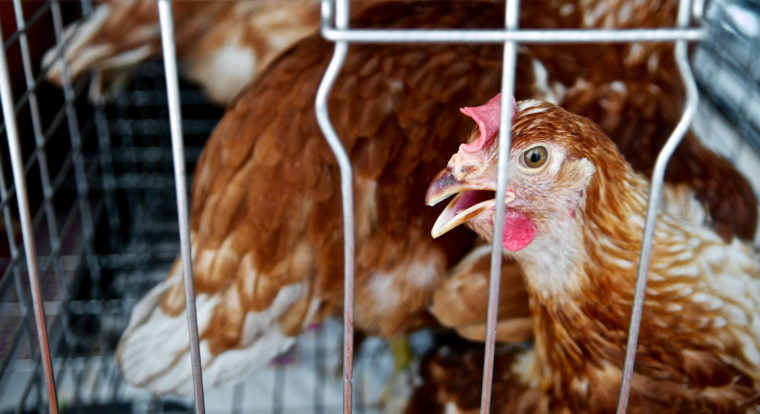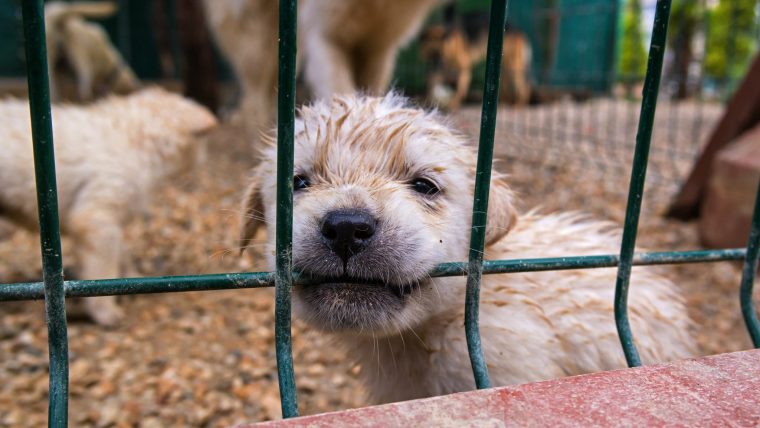Which Act Requires Minimum Standards Of Treatment And Care For Animals?
In the United States, animal protection laws can be enacted and enforced at every level of government.
Most animal protection legislation happens at the state level. In that location are also a handful of federal beast protection laws. Additionally, some cities and counties pass ordinances to protect animals.
This is why it's critically important to abet for better animal protection laws with lawmakers in all regime bodies. Each has the power to aid.
Federal Beast Protection Laws
At that place are only a handful of federal animal protection laws:
The Animal Welfare Act: Signed into law in 1966, the Animal Welfare Act (AWA) is the primary federal animal protection police. The AWA mainly involves animals kept at zoos and used in laboratories, likewise as animals who are commercially bred and sold similar those in puppy mills.

The AWA directs the Secretary of the United States Department of Agriculture to set minimum standards regarding these animals' "handling, intendance, treatment, and transportation." Dog fighting and cockfighting are also prohibited nether the Animate being Welfare Act, and then long equally the activity in some manner crosses country lines.
The AWA itself, as well every bit its enforcement by the Department of Agronomics, are often criticized for assuasive inhumane practices to become unchecked.
The "28 60 minutes Law": This law, enacted in 1873, requires vehicles transporting certain animals for slaughter to finish every 28 hours to allow the animals practise, food and water. The law does not apply if the vehicle in which animals are beingness transported contains access to nutrient or water, and there are many other exceptions as well. Birds like chickens and turkeys, which are the most-farmed animals in the Usa, are considered exempt by the federal authorities.
The Humane Slaughter Human action, or the Humane Methods of Livestock Slaughter Deed : This law was first passed in 1958, then amended in 1978. The Humane Methods of Slaughter Act requires that animals be stunned into unconsciousness before slaughter, to minimize hurting.
Though chickens, turkeys and other birds feel pain just like other animals, they are not protected by this police. Enforcement of this law has been found by government inspectors to be "inconsistent."

The Endangered Species Act : Enacted in 1973, the Endangered Species Deed protects fish, mammals and birds – every bit well as plants – listed every bit threatened or endangered in the United States and across. The ESA outlines procedures for federal agencies to follow regarding listed species, every bit well as criminal and ceremonious penalties for violations. This law is chiefly administered past the U.S. Fish and Wildlife Service and the U.S. National Oceanic and Atmospheric Assistants Fisheries Service.
The PACT (Preventing Animate being Cruelty and Torture) Act: Signed into constabulary in 2019, the PACT Deed makes some of the most egregious forms of animal cruelty — specifically crushing, called-for, drowning, suffocating, impaling or sexual exploitation — in or affecting interstate commerce or within the territorial jurisdiction of the United States a federal crime.
The Animal Crush Video Prohibition Act banned the creation and distribution of so-called "crush videos" — where people torture, crush, and kill pocket-sized animals, such equally puppies and hamsters, for the titillation of viewers — in 2010. The PACT Act goes a step farther and bans the underlying animal cruelty contained in them.
The vast majority of animal cruelty laws are at the state level. The PACT Act creates a corresponding federal animal cruelty statute. While the PACT Human action is a meaning stride frontward for animals, it's important to note its limitations. Among its numerous exemptions are "customary and normal" agronomical and veterinarian practices as well as slaughtering animals for nutrient.
The Lacey Act: Enacted in 1900, the Lacey Act bans illegal wildlife trafficking. It was the commencement federal police protecting wild animals. Specifically, it prohibits trade in wild animals and plants that have been illegally taken, possessed, transported, or sold. Information technology besides prohibits the falsification of documents regarding the auction and shipment of wildlife. For case, the Lacey Act can exist used to prosecute a dealer who sells endangered turtles smuggled from Costa rica or a roadside zoo who falsifies documents to sell a tiger cub across state lines.
State And Local Animate being Protection Laws
About creature protection laws are enacted and enforced at the state level.
Because at that place are and then many state laws involving animal protection, this won't exist a detailed guide, but an overview of the types of laws y'all'll more often than not observe at the state level. We recommend y'all check out the Animal Legal Defense Fund's annual Rankings Report on the best and worst states for animal protection laws for more in-depth information.
Country animal protection laws are primarily concerned with companion animals, though there are too some land wildlife protection laws. Farmed animals and animals used in laboratories are frequently excluded from land animal protection laws, equally are wildlife in some contexts.
Each of the fifty states now has a felony beast cruelty police on the books. Each state determines what constitutes cruelty, and the penalties for committing cruelty.
Companion animals:
Companion animals – a category oft express to dogs and cats, only that sometimes includes birds, horses, and other animals besides – usually receive the strongest level of protection under land laws. Even so, there have been cases where someone has been prosecuted for having committed egregiously cruel acts against wild fauna or farmed animals.
This can even extend to marine animals. In 2017, 3 Florida teenagers were charged with fauna cruelty for their torture of a shark.
Each land also has laws governing some aspects of the "hands-on" intendance of animals. For case, there are laws regulating how long animal shelters must "agree" stray animals before they can be adopted or euthanized. There are also laws about how frequently pets must be vaccinated against rabies. States often as well have some regulations apropos commercial breeding of companion animals.
"Hot motorcar laws" criminalize leaving an animal in a vehicle in extreme weather, and some hot car laws allow these animals to exist rescued from vehicles in certain circumstances and make the rescuer allowed from civil or criminal liability. Anti-tethering laws limiting how long pets can exist tied up or chained outside, particularly in extreme weather, are also growing in popularity, as are laws allowing pets to exist included in domestic violence protective orders.

California is at the forefront of some other statewide animal protection measures. In 2017, California became the first state to pass a statewide "retail pet auction ban." Nether this law, retail establishments like pet stores may simply sell cats, dogs and rabbits coming from shelters and rescue groups—and not from commercial breeders. Maryland passed its own statewide retail pet sale ban in 2018, becoming the second state with this blazon of law.
Wild animals:
Each state also has wildlife protection laws, too as laws regarding the time and manner under which it is sanctioned to kill wildlife through hunting and fishing.
Wild animal functioning bans: Some states regulate the use of wild animals in performances. In 2017, Illinois and New York passed the state'south outset statewide bans on the use of elephants in entertainment. This is generally seen as the beginning of a more widespread trend.
Farmed animals:
While farmed animals are frequently left out of state fauna protection laws, a number of states have adopted measures to limit the use of "intensive confinement" farming practices. Such practices entail circumscribed animals in restraints that are and then minor the animals often can't fully stand or motility effectually. Chickens and hens kept in battery cages don't have room to stretch their wings.
Local animal protection laws: Many other companion animal protection measures are enacted and enforced at the local level. For example, hundreds of cities and counties have retail pet auction bans similar California'due south and Maryland's.

Similarly, in states without anti-tethering laws, many cities and counties pass their own such laws. A growing number of cities are passing and enforcing their own wild animal functioning bans.
While country and federal laws would offer more than protection to more animals, these local laws are very important. They not only protect the animals in that expanse – but they tin likewise human activity every bit a bellwether for more than expansive protections to come up. It is non infrequent for new animal protection measures to begin at the city or county level, and then every bit the public increasingly demands it, to exist taken upwardly past the state legislators.
Source: https://aldf.org/article/laws-that-protect-animals/
Posted by: sampsonthemposs.blogspot.com

0 Response to "Which Act Requires Minimum Standards Of Treatment And Care For Animals?"
Post a Comment